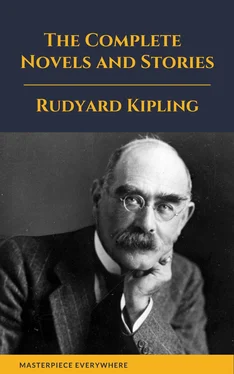‘Two or three hundred rupees a year.’ Father Victor was long past any sense of amazement. Bennett, impatient, did not understand.
‘He says: “Write that name and the money upon a paper and give it him.” And he says you must write your name below, because he is going to write a letter in some days to you. He says you are a good man. He says the other man is a fool. He is going away.’
The lama rose suddenly. ‘I follow my Search,’ he cried, and was gone.
‘He’ll run slap into the sentries,’ cried Father Victor, jumping up as the lama stalked out; ‘but I can’t leave the boy.’ Kim made swift motion to follow, but checked himself. There was no sound of challenge outside. The lama had disappeared.
Kim settled himself composedly on the chaplain’s cot. At least the lama had promised that he would stay with the Rajput woman from Kulu, and the rest was of the smallest importance. It pleased him that the two padres were so evidently excited. They talked long in undertones, Father Victor urging some scheme on Mr. Bennett, who seemed incredulous. All this was very new and fascinating, but Kim felt sleepy. They called men into the tent—one of them certainly was the Colonel, as his father had prophesied—and they asked him an infinity of questions, chiefly about the woman who looked after him, all of which Kim answered truthfully. They did not seem to think the woman a good guardian.
After all, this was the newest of his experiences. Sooner or later, if he chose, he could escape into great, gray, formless India, beyond tents and padres and colonels. Meantime, if the Sahibs were to be impressed, he would do his best to impress them. He too was a white man.
After much talk that he could not comprehend, they handed him over to a sergeant, who had strict instructions not to let him escape. The regiment would go on to Umballa, and Kim would be sent up, partly at the expense of the Lodge and in part by subscription, to a place called Sanawar.
‘It’s miraculous past all whooping, Colonel,’ said Father Victor, when he had talked without a break for ten minutes. ‘His Buddhist friend has levanted after taking my name and address. I can’t quite make out whether he’ll pay for the boy’s education or whether he is preparing some sort of witchcraft on his own account.’ Then to Kim: ‘You’ll live to be grateful to your friend the Red Bull yet. We’ll make a man of you at Sanawar—even at the price o’ making you a Protestant.’
‘Certainly—most certainly,’ said Bennett.
‘But you will not go to Sanawar,’ said Kim.
‘But we will go to Sanawar, little man. That’s the order of the Commander-in-Chief, who’s a trifle more important than O’Hara’s son.’
‘You will not go to Sanawar. You will go to thee war.’
There was a shout of laughter from the full tent.
‘When you know your own regiment a trifle better you won’t confuse the line of march with line of battle, Kim. We hope to go to “thee war” sometime.’
‘Oah, I know all thatt.’ Kim drew his bow again at a venture. If they were not going to the war, at least they did not know what he knew of the talk in the verandah at Umballa.
‘I know you are not at thee war now; but I tell you that as soon as you get to Umballa you will be sent to the war—the new war. It is a war of eight thousand men, besides the guns.’
‘That’s explicit. D’you add prophecy to your other gifts? Take him along, Sergeant. Take up a suit for him from the Drums, an’ take care he doesn’t slip through your fingers. Who says the age of miracles is gone by? I think I’ll go to bed. My poor mind’s weakening.’
At the far end of the camp, silent as a wild animal, an hour later sat Kim, newly washed all over, in a horrible stuff suit that rasped his arms and legs.
‘A most amazin’ young bird,’ said the sergeant. ‘He turns up in charge of a yellow-headed buck-Brahmin priest, with his father’s lodge certificates round his neck, talkin’ God knows what all of a red bull. The buck-Brahmin evaporates without explanations, an’ the bhoy sets cross-legged on the chaplain’s bed prophesyin’ bloody war to the men at large. Injia’s a wild land for a God-fearin’ man. I’ll just tie his leg to the tent-pole in case he’ll go through the roof. What did ye say about the war?’
‘Eight thousand men, besides guns,’ said Kim. ‘Very soon you will see.’
‘You’re a consolin’ little imp. Lie down between the Drums an’ go to bye-bye. Those two boys beside ye will watch your slumbers.’
▲▲▲
Now I remember comrades—
Old playmates on new seas—
Whenas we traded orpiment
Among the savages.
Ten thousand leagues to southward,
And thirty years removed—
They knew not noble Valdez,
But me they knew and loved.
Song of Diego Valdez .
Very early in the morning the white tents came down and disappeared as the Mavericks took a side-road to Umballa. It did not skirt the resting-place, and Kim, trudging beside a baggage-cart under fire of comments from soldiers’ wives, was not so confident as overnight. He discovered that he was closely watched—Father Victor on the one side, and Mr. Bennett on the other.
In the forenoon the column checked. A camel-orderly handed the Colonel a letter. He read it, and spoke to a Major. Half a mile in the rear, Kim heard a hoarse and joyful clamour rolling down on him through the thick dust. Then some one beat him on the back, crying: ‘Tell us how ye knew, ye little limb of Satan? Father dear, see if ye can make him tell.’
A pony ranged alongside, and he was hauled on to the priest’s saddle-bow.
‘Now, my son, your prophecy of last night has come true. Our orders are to entrain at Umballa for the front to-morrow.’
‘What is that?’ said Kim, for ‘ front ’ and ‘ entrain ’ were newish words to him.
‘We are going to “thee war,” as you called it.’
‘Of course you are going to thee war. I said last night.’
‘Ye did; but, Powers o’ Darkness, how did ye know?’
Kim’s eyes sparkled. He shut his lips, nodded his head, and looked unspeakable things. The chaplain moved on through the dust, and privates, sergeants, and subalterns called one another’s attention to the boy. The Colonel, at the head of the column, stared at him curiously. ‘It was probably some bazar rumour,’ he said; ‘but even then——’ He referred to the paper in his hand. ‘Hang it all, the thing was only decided within the last forty-eight hours.’
‘Are there many more like you in India?’ said Father Victor, ‘or are you by way o’ being a lusus naturæ ?’
‘Now I have told you,’ said the boy, ‘will you let me go back to my old man? If he has not stayed with that woman from Kulu, I am afraid he will die.’
‘By what I saw of him he’s as well able to take care of himself as you. No. Ye’ve brought us luck, an’ we’re goin’ to make a man of you. I’ll take ye back to your baggage-cart and ye’ll come to me this evening.’
For the rest of the day Kim found himself an object of distinguished consideration among a few hundred white men. The story of his appearance in camp, the discovery of his parentage, and his prophecy, had lost nothing in the telling. A big, shapeless white woman on a pile of bedding asked him mysteriously whether he thought her husband would come back from the war. Kim reflected gravely, and said that he would, and the woman gave him food. In many respects, this big procession that played music at intervals—this crowd that talked and laughed so easily—resembled a festival in Lahore city. So far, there was no sign of hard work, and he resolved to lend the spectacle his patronage. At evening there came out to meet them bands of music, and played the Mavericks into camp near Umballa railway station. That was an interesting night. Men of other regiments came to visit the Mavericks. The Mavericks went visiting on their own account. Their pickets hurried forth to bring them back, met pickets of strange regiments on the same duty; and, after a while, the bugles blew madly for more pickets with officers to control the tumult. The Mavericks had a reputation for liveliness to live up to. But they fell in on the platform next morning in perfect shape and condition; and Kim, left behind with the sick, women, and boys, found himself shouting farewells excitedly as the trains drew away. Life as a Sahib was amusing so far; but he touched it with a very cautious hand. Then they marched him back in charge of a drummer-boy to empty, lime-washed barracks, whose floors were covered with rubbish and string and paper, and whose ceilings gave back his lonely footfall. Native fashion, he curled himself up on a stripped cot and went to sleep. An angry man stumped down the verandah, woke him up, and said he was a schoolmaster. This was enough for Kim, and he retired into his shell. He could just puzzle out the various English Police notices in Lahore city, because they affected his comfort; and among the many guests of the woman who looked after him had been a queer German who painted scenery for the Parsee travelling theatre. He told Kim that he had been ‘on the barricades in Forty-eight,’ and therefore—at least that was how it struck Kim—he would teach the boy to write in return for food. Kim had been kicked as far as single letters, but did not think well of them.
Читать дальше












